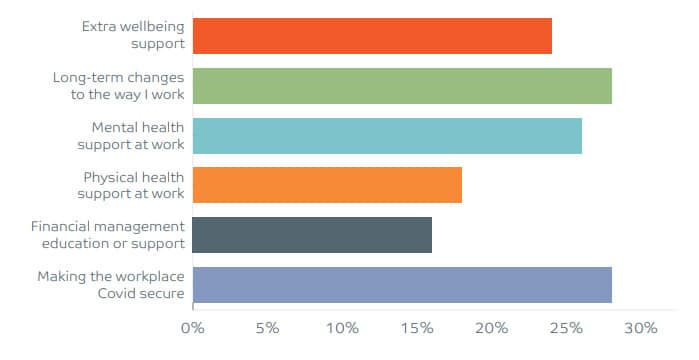In our latest report, Coping with Covid, we explore the mental health impact of the pandemic on businesses, wellbeing in covid-19 and the different perspectives within organisations, to find out where support is needed the most.
We asked 1,600 employees and HR professionals about their experience with working the through the pandemic so far. One of the most striking aspects of the research was that employees and HR leaders reported vastly different opinions on the state of wellbeing in their organisation.
Despite this, HR teams are increasingly making wellbeing a priority, and armed with the right data they will be able to pave the way to recovery and help their employees cope.
HR and employees are seeing things differently
When asked how they felt about morale, wellbeing and productivity, employees were generally more negative than HR leaders.
Over a third of employees (35%) reported mental wellbeing as ‘not good’ or ‘not good at all’, compared to only 7% of HR leaders. In fact, less than 1% of HR leaders felt that mental health at their company was ‘not good at all’.
When asks about productivity at their organisation, 40% of HR leaders said productivity is ‘very good’, but only 20% of employees felt this way.
It seems that HR teams are struggling to see the full impact of Covid on their employees, and may find it difficult to plan ahead for a workforce suffering from lower wellbeing (and productivity) than expected.
The good news is there’s a clear opportunity for HR to make a real difference to the employee wellbeing experience. Before we return to business as usual, HR and leadership teams must ensure their people are supported through the pandemic, ready to emerge healthier, happier and more motivated.
Wellbeing is getting more important to HR teams
While employees may be struggling, HR teams are recognising the importance of the support they can offer. With 84% of HR leaders telling us that wellbeing is getting more important to their business, the signs suggest that a culture shift may be occurring.
Our research found that 81% of businesses increased their wellbeing spend due to Covid-19, and just over a third (36%) of HR leaders are expecting their wellbeing spend to increase further in 2021. But as lockdown continues, the immediate concern is to ensure that employees have access to the support they need to cope with the on-going pandemic.
Wellbeing performance within an organisation can be benchmarked using employee surveys and workshops, helping HR teams to assess where support is needed most. Our free resources for HR professionals offer practical advice and suggestions to brush up your wellbeing strategy in these difficult times.
What support do employees need now?
The areas in which employees need help the most will differ across sectors and individual organisations, but our survey shows a number of gaps emerging.

Almost a quarter (24%) of employees said they are looking for extra wellbeing support in the coming months, and even more (26%) singled out mental health support as something they require.
Worryingly, 28% of employees are still looking for their workplace to be made more Covid secure. This is particularly prominent in industries such as manufacturing and construction, where social distancing is more difficult. In fact, almost two in five manufacturing employees (39%) felt that their workplace was not secure enough.
Long term changes to working practices, such as working from home or flexitime, were coveted by 28% of employees, suggesting that many are hoping to change their working environment as part of their ‘new normal’.
As workplace culture continues to shift and wellbeing rises up the agenda, the current challenge is to ensure that support lands where it’s needed the most. For a full breakdown of our findings, including practical advice for HR teams and line managers, download the full report:
Coping with Covid: the hidden cost to businesses (and their people)
